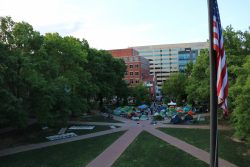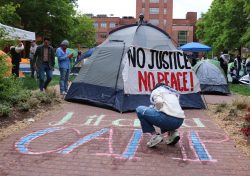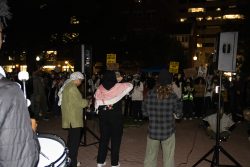The Georgetown University Student Association sent a letter to University President John J. DeGioia Friday expressing concern regarding the new student safety policies on campus. As of the beginning of this school year, students no longer have 24-hour access to University buildings other than their own on-campus residence buildings.
The new policy is actually less safe for students, said GUSA President Kaydee Bridges (SFS ‘03), Vice President Mason Ayer (SFS ‘03) and other GUSA cabinet members in the letter.
According to Vice President for Communications Julie Green Bataille, the events of Sept. 11 forced the University to re-evaluate campus security last year.
“Obviously the events of last Sept. 11 force us to confront a new reality in terms of emergency preparedness, safety and security,” Bataille said. “These measures, which include enhanced precautions on all campuses and in residence halls, have gone into effect and are now being implemented. These measures have been developed in order to best work to protect the safety and security of our entire campus community.”
GUSA representative Mike Lanzara (MSB ‘05), who introduced the resolution to write a letter to the assembly, said that the new safety policy not only fails to protect students’ safety but actually presents a safety hazard on campus.
Because access to residence buildings is limited to residents under the new policy, students have increasingly resorted to propping up entrance doors and letting non-residents sneak in, according to the students’ letter.
“We recognize, of course, that students engaging in these two practices should take greater responsibility for the safety of their campus, but we believe that University policy should not endanger the majority of students because of the carelessness of a few. By creating a situation in which non-students can enter University buildings virtually at will, the new policy does just that,” the letter reads.
Students also need access to all University buildings to deter or escape crime, according to the letter.
Without 24-hour access to all University buildings, students being attacked or mugged on or near campus will have no place to go, GUSA claims. The letter reports that students have previously been able to avoid becoming victims by ducking into LXR or Nevils while walking along N Street or 35th Street.
Bridges said that 24-hour access to all University buildings would also allow students to enter laundry facilities, resident housing offices, computer labs, practice rooms and places of worship such as the Muslim and Protestant prayer rooms in Copley Hall.
While administrators considered granting limited access to the Muslim prayer room to students who regularly used it, Bridges said that this policy “only adds to the bureaucracy of the system” and stressed the need for one policy that could work for all students.
According to Lanzara, student input was not sought or used in the process of drafting the new safety policy.
Bridges said that she was not invited to participate in discussions for the new safety policy despite the fact that she was in the area all summer. She said that she learned of the new policy only a week and a half before students returned to campus.
“Student input should be sought on things like this that impact students so directly,” Bridges said.
According to both administrators and students, cooperation on this project is likely in the future.
“[Administrators] expressed a willingness to work with students on these topics,” Bataille said.
Bridges also noted that the administration now seems relatively open to student input.
“I think they’re willing to talk to us, although I don’t know how willing they are to change the policy,” Bridges said.




